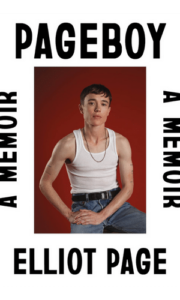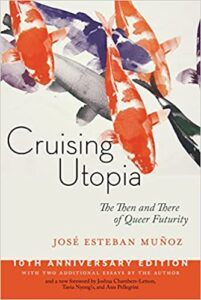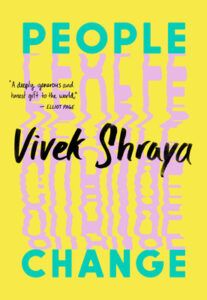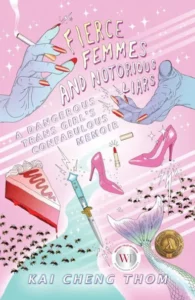It’s been a little over a week since the publication of Elliot Page’s memoir, Pageboy, and the haters have settled in on Goodreads. This isn’t surprising. Page is perhaps the most publicly visible trans celebrity to publish a memoir in recent memory. What’s more, though he does write about his career in Hollywood, the making of movies like Juno and Whip It, and his relationships with famous actors, in many ways, the book is not a traditional celebrity memoir. Pageboy is an intimate, vulnerable, and poetic coming-into-self story about one trans man’s deeply personal and specific journey. It’s not a chronological story, either — it’s a queerly beautiful collection of memories and moments. Page moves around in time, skipping from childhood to the near-present to his early acting career and back. This nonlinear structure will feel bone-deep true to many queer and trans readers. It certainly felt like home to me.
It’s also what some readers seem to have such a problem with. After finishing the book, completely delighted by the inherent queerness of this structure, and with a queasy feeling in my gut that people were going to hate it, I spent about seven minutes scrolling through Goodreads. I did not read every review, but seven minutes was enough to confirm my suspicions. There are, happily, many glowing reviews. But the theme of the negative reviews is consistent: Why couldn’t he have told this story chronologically? It was so confusing to keep track of the timeline! I couldn’t make sense of the nonlinear structure. None of these are actual quotes — I’m paraphrasing from lots of reviews.
What’s even more telling is the surprising number of positive reviews with a caveat. I read several four-star reviews praising Page’s writing and honesty, exclaiming how much they enjoyed the book on a whole and then — but why did he have to tell it this way? It would have been so much better and easier to follow if it has been told chronologically. Again, I’m paraphrasing.
Before we get into it, I have to ask — did we read the same book? Because, readers, Page explains it in the third paragraph of the author’s note. The third paragraph. He literally could not be more clear about why he wrote the book the way he did:
“These memories shape a nonlinear narrative, because queerness is intrinsically nonlinear, journeys that bend and wind. Two steps forward, one step back. I’ve spent much of my life chipping away toward the truth, while terrified to cause a collapse. This is reflected on the page intentionally. In many ways, this book is the story of my untangling.”
He lays it out, explaining his choices for an audience that might not understand the way queer time feels — and still, readers are furious because the book does not adhere to their idea of what a trans memoir should look like. It does not adhere to neat, binary notions about transition and change.
Queer and trans lives do not always follow the same timelines that cis and straight lives follow. We do not always hit the same milestones at the same times. Our lives are not always legible to those on the outside. This is one of the most beautiful things about queerness — the way it invites us to shed ways of moving through time that do not serve us. This idea is not new. Queer scholar José Esteban Muñoz famously theorized about queer time in Cruising Utopia: The Then and There of Queer Futurity (and many other works). Most queer people I know intrinsically understand this idea; we often see it reflected in each other.
Pageboy follows a distinctly queer, distinctly trans timeline. By refusing to tell a linear story that moves simply from then into now, by instead sharing his journey as a collection of interconnected moments — painful, joyful, complicated, challenging, beautiful — Page refuses to divide himself in two. He refuses to give any space to the violent idea that trans lives are only real when they’re visible. There is no “before” and “after,” no arrival at a longed-for destination. He writes about coming out as gay, transition, gender dysphoria, childhood trans joy, falling in love, the deep pain of being closeted, queer teenage friendships. It’s all change; it’s all movement. There are dozens and dozens of longed-for destinations. Memories spark other memories, lead to unexpected places, reveal hidden truths years and years later.
This is the beauty of queer and trans chronology: it does not bifurcate lives. It allows for expansive understandings of self, for moments of boundless joy in the midst of impossible, painful years, and for experiences of deep sadness even amidst abundance. This is the chronology that whirrs along in every line of this memoir, in Page’s slow “untangling.”
Page is certainly not the first trans writer to play with time like this. Pageboy is part of a long, rich lineage of queer and trans storytelling that refuses easily legible linear timelines. Vivek Shraya infuses her beautiful book People Change with trans chronology. She explores all the ways in which binary understandings of change — destroying an old self in order to become someone new — are harmful to everyone. Writer and performer Travis Alabanza’s incredible book None of the Above is a memoir that moves around in time, delving into the beauty (and necessity) of fluidly. Alabanza explodes binaries of all kinds, exposing their violence, rooted in white supremacy and colonialism. They imagine a world that doesn’t dissect and bifurcate and worship finality, that instead celebrates process.
All of Eli Clare’s books play with time. In both Exile & Pride and Brilliant Imperfection, he writes about the intersections of queerness, transness, and disability. In Brilliant Imperfection, which is about his own and other people’s complex and contradictory experiences with cure — the persistent idea that disabled people need to be fixed — he writes away from a certain destination, and instead towards trans lives lived always in a state of becoming.
I could go on at length. Cooper Lee Bombardier’s memoir-in-essays Pass with Care is similar to Pageboy in its approach to chronology: Bombardier jumps around in time, following threads of emotion from memory to memory. Jeanne Thornton’s novel Summer Fun is a wildly strange and gloriously queer novel that builds its own trans timeline, page by page. Fierce Femmes and Notorious Liars by Kai Cheng Thom is a novel in memoir form that is similarly inventive: the timeline may be chronological, but it messes with genre conventions in specifically trans ways.
None of these authors are famous the way Elliot Page is famous. Most of them are not famous at all. Their books have mostly been read by queer and trans people (though everyone should read them!), a readership likely to immediately understand their nonlinear structures. Pageboy is going to have a different kind of audience, people who, like the early Goodreads reviewers, have probably never thought about trans storytelling structures, like alone trans chronology.
The nonlinear structure is not a gimmick. It’s not there to confuse you. If you don’t like it, take a moment to think about why. Why does it make you uneasy to not be able to easily untangle the timeline? Is it because you’re trying to fit it all together — wait, was he out as trans in this moment, what year was this, how old was he here, had he already transitioned during this interaction?
These are not the right questions. These questions don’t matter. Elliot Page doesn’t owe anyone easy legibility. Trans people do not owe the cis world binary timelines. Queer and trans storytelling is sacred, and sometimes it does not feel or sound like straight storytelling. You can choose to leave a petty review about how a book was hard to understand because it does not reflect your experience of the world. Or you can choose to learn from it. You can choose to let it expand your ideas about queer and trans lives — whole, messy, nonlinear lives lived in beautiful flux. You can choose to step away from your own timeline, and in the unfamiliar but not unwelcome strangeness of a different one, maybe you’ll even discover something new about yourself.
Elliot Page was bookish long before he wrote a memoir! While you’re waiting for your Pageboy hold to come in, you can read all about his literary life.




